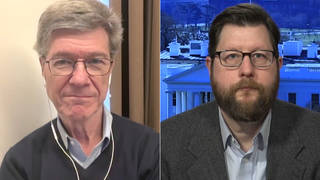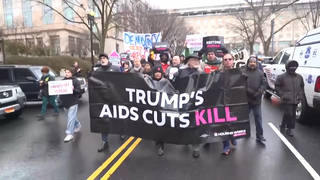
Related
We speak with Dolores Huerta of the United Farm Workers of America and Francis Fox Piven, one of the country’s leading sociologists, about class and organized labor during Reagan’s presidency. [Includes transcript]
As we move to the issue of workers right’s and labor under Ronald Reagan. Many critics of the former president recall with great anger the policies of Reagonomics. His administration was one of the worst in history for organized labor. And his track record was consistent almost from the beginning of his career in the public eye. In the late 1940’s, as president of the Screen Actors’ Guild union, Ronald Reagan testified before the House Un-American Activities Committee on so-called “subversive activity” in Hollywood, reporting on actors, directors, and screenwriters deemed Communist sympathizers.
And in the 1960’s and 70’s, as Governor of the State of California, Reagan fought the efforts of migrant farm workers to win union contracts, vetoing the Agricultural Labor Relations Act, a bill granting farm workers collective bargaining rights. In one well-publicized episode, then-Governor Reagan appeared on television eating grapes in defiance of a union-sponsored boycott against miserable working conditions in California’s vineyards.
In August of 1981, thirteen thousand members of the Professional Air Traffic Controllers Organization, or PATCO, ignored federal laws prohibiting strikes and walked off the job in protest of long shifts and mandatory overtime. PATCO was one of a few unions that backed the newly inaugurated Ronald Reagan in the 1980 election, but the union would soon regret its decision to support the President. On August 3rd, Reagan ordered the striking controllers back to work:
(Tape)
“Let me read the solemn oath taken by each of these employees. I am not participating in any strike against the government of the United States or any agency thereof. It is for this reason that I must tell those that fail to report to duty this morning they are in violation of the law, and if they do not report for work within forty-eight hours, they will be terminated.”
Two days later, Reagan made good on his promise, firing more than eleven thousand air traffic controllers, jailing strike leaders and ultimately abolishing the union. It was the first time in U.S. history that permanent replacement workers had been used on such a wide scale to break a strike.
- Francis Fox Piven, one of the country’s leading sociologists. She is Distinguished Professor of Political Science and Sociology at the City University of New York. She is author of a number of books on class, including “Regulating the Poor,” “Poor Peoples’ Movements,” and “The New Class War.”
- Dolores Huerta, Co-founder of the United Farm Workers of America with Cesar Chavez. Her efforts to organize the mostly immigrant farm workers of California in the 1960’s and 70’s were resisted at every turn by then-Governor Ronald Reagan.
Transcript
AMY GOODMAN: We’re joined right now by Dolores Huerta, co-founder of the United Farm Workers of America with Caesar Chavez. Her efforts to organize the mostly immigrant farm workers of California in the 60’s and 70’s were resisted at every turn by then Governor Ronald Reagan, and Francis Fox Piven, one of this country’s leading sociologists. She’s Distinguished Professor of Political Science and Sociology at the City University of New York, author of many books including: “Regulating The Poor,” “Poor People’s Movements” and “The New Class War.” Dolores Huerta, can you describe then Governor Reagan, Governor of California’s relationship with farm workers and the kind of organizing efforts that you were doing with the United Farm Workers?
DOLORES HUERTA: Well as you know we had a very major group strike followed by a great boycott after we were being arrested and really couldn’t picket anymore and had all of these injunctions. Governor Reagan was one of the people in the forefront of fighting against the farm workers as you mentioned by eating grapes in public. It was interesting that the farm workers said once, they’re going to put a man on the moon before farm workers get unemployment insurance. The state legislature passed unemployment insurance for farm workers three sessions in a row. That was vetoed by Governor Reagan. It wasn’t until Governor Jerry Brown was elected as the Governor of California that farm workers finally got unemployment insurance, dozens of years after the other people in the country had received unemployment insurance.
Casper Weinberger, who was one of his buddies that we have seen on television recently, was out there debating and asking people not to support the grape boycott. One other thing I want to mention, too, just to kind of show the racism of that administration–when we were able to pass the Immigration Reform Act in 1984–and you know, people kind of forget that some of these things were passed like Dr. King’s holiday, was because we had a Democratic Congress and a Democratic Senate as was with the Immigration Reform Act, where we had some farm workers that were legalized and of course other people in the country. But then what they did, the Reagan Administration brought up the President of the Farm Bureau of Florida and put that man in charge of running the regulations for all of those farm workers who could get legalization under the IRCA act of 1984. What he did is that they made a regulation saying that sugar cane was not a perishable crop. Sugar cane cutting has been exempted from the Fair Labor Standards Act. When you translate that, what happened is that farm workers who brought in with H2A workers from Haiti, from Jamaica, from the Barbados Islands which are of African descent, that all of these farm workers who had a record of employment in agriculture in the United States were totally locked out of the amnesty of 1984-1985 that was passed.
That was a straight racist act. There was a lawsuit that was filed. It was lost, and there were probably about 20,000 African descended farm workers from those countries that should have been under that H2A act. I also want to mention that we know later on Reagan was one of the proponents of the “Star Wars” kind of a defense system, and you know, when we think about that comment of a man on the moon that he–you know, he thought so much of technology and yet had very, very little feeling for poor people. You know, I just want to quote–share this with listeners is that, you know, I was at an immigrant workers night classes the other day where they were learning English and they had on their wall, one of the things they were being taught, a quote from Voltaire which said, “Those who can make us believe in absurdities can also make us commit atrocities.” I think that all of this stuff we have been seeing on Reagan and the good guy that he was, is one of those absurdities that the media is making us believe.
AMY GOODMAN: Francis Fox Piven, can you share your thoughts on this week, the kind of media coverage that we have seen, which is not just about remembering a man, it is about really righting a record, a history of the period of the 1980’s.
FRANCIS FOX PIVEN: Yes. Well, I think that Ronald Reagan was one of the most damaging Presidents in American history, and that we’re still living with the kind of damage that he has done to American policies. Just as important and maybe more important in American politics, as you have said and your guests have said, Ronald Reagan presided over a set of policies that were anti-union–smashing the Air Controllers, and that was only the very beginning of a very anti-union National Labor Relations Board set of decisions. He presided over slashes in aid to the cities and welfare, unemployment insurance, housing. But what is remarkable about Reagan’s record, I think is not that he did that. After all, Presidents after him have done that, too. George Bush is doing that. But he managed to fashion a coalition, a majority coalition which included big business, his cronies in big business. It also included not only the populist right, not only the christian fundamentalists, but much of the American working class. So, we have got to ponder, I think, how he managed to do this. It was partly his John Wayne persona, his avuncular manner, but it was also the way in which he took advantage of the anxieties that had been stored up by the movements of the 1960’s.
Movements which made real progress in the United States, the Black Movement, the Poor People’s Movement of the cities. The Women’s Movement, the Anti-War Movement. All those movements have made progress, but the progress took a toll on many in the American middle class and working class because it changed America. Those changes, changes in the family, changes in sexual morays, changes in racial patterns, the assault on patriotism. All of this took a kind of psychological toll, and Reagan’s politics tapped a soreness that was created in the American psyche. He was a backlash politician, and he used the backlash sentiments, anxieties, hysteria, even, to create a majority coalition not only made up of big business, we can understand that, but made up of the South and much of the working class North as well. He spoke in something of a code. He didn’t attack blacks, but instead, he attacked welfare. When he attacked welfare, he was attacking blacks, because everybody knew who he meant by the “welfare queen.” He was attacking both blacks and women. He used to code about welfare, states rights, affirmative action. By doing that, he accomplished the incredible, that is twisting our politics to this day. He formed a popular majority by feeding their–the resentments that Americans felt with progress that had been made by those below them. In a way he turned their resentments against those below them. Even while he changed the tax code so that it became much more regressive. Not only did he slash taxes on the affluent, but in 1983, he presided over a huge tax increase for working people, and of course, he rolled back the programs that were provided working people with some protections–protections of the right to unionize, protections through unemployment insurance and so on.
AMY GOODMAN: Dolores Huerta, as you watched in 1981, August, when the 13,000 members of PATCO were fired after standing up, this most conservative union, the union that had supported President Reagan in his first bid for President, how did that relate to you? You might not have found a group who had less in common with the United Farm Workers except that you were both unions?
DOLORES HUERTA: Well, I think that really set off a whole chain of people who were starting to cut wages. We found that right after the PATCO People were fired, the United Autoworkers ended negotiations, made an agreement to freeze their wages. That put a lot of pressure on the other unions to do the same thing. So, what you had is you had a tremendous weakening of the power of labor shortly after that. It sent a big chill throughout the whole labor movement. I think that all of the workers at negotiations were pretty much stagnated. And I know that I, as a negotiator for the United Farm Workers at that time, that every time you went into a negotiation, of course, that was referred to, what the Auto Workers had done in terms of freezing wages and not asking for increases and as was said earlier that–I think that you mentioned it, is that people did forget that we did go into a recession at that time. So, therefore it, had a big impact. The other thing, too, that, you know, at one point, he cut the food stamps for immigrants. He did this right around Christmas time, which was another very big chilling thing that happened to poor people. In California, at one point in time, before Reagan became Governor, California had probably the best, if not one of the best mental health systems in the whole United States of America. I’m speaking to you from Stockton, California. There was a great Senator here named Senator Allen Short, who had done so much in a very innovative way to establish a very good mental health system. Well, Reagan totally dismantled that health system that we had at one time in California, which was one of the best, and today is now one of the worst.
AMY GOODMAN: Dolores Huerta, one of the founders of the United Farm Workers of America. Reverend Hagler, as you listen to this conversation, you’re also based in Washington, where the state funeral is taking place today of Ronald Reagan. Can you share your final thoughts?
REVEREND GRAYLAN HAGLER: Well, I mean, one of the things is that–I mean, I just was listening to all of the comments and the comments are extremely important for us to just simply remember that what we are seeing and hearing is not real, but we’re still paying the costs of this administration. We’re still having to deal with what was started, sort of a very anti-labor movement. A backlash to the movements that moved people, in a sense, from the back of the bus to hopes to have a place in the society. We’re still suffering from the backlash of that economic restructuring that took place under the administration that just simply made the wealthier even that much more wealthy. To an obscene level, and made the working class and the poor poorer and dispossessed us of a place to live, a dignity and respect. You know, just continual attacks that are carried out right now to this day. What we’re also really witnessing is in a sense right now and what happened when Reagan was elected, was that the old guard who felt that they had lost power in this country by having to open up their arms and include a very diverse constituency, and at least give that very diverse constituency hope and a sense of possibility. When Reagan was elected, it was a re-establishment of that old guard being back in charge. And the message was clear. Not only domestically, but around the world, that it’s time to get back to the back of the bus. There is a new driver in charge, and that driver is the old historical driver that basically maintained a system of rich and poor, a system of black and white.
AMY GOODMAN: Carol Fennelly, your final thoughts
CAROL FENNELLY: Well, the city, I mean Washington too, and the city has been completely disrupted by this three day grief glut that we are going through. I thought that it was completely appropriate that President Reagan would be brought into town on Wednesday at rush hour. We do a teleconference program out of our home, out of our office for kids so that they can talk to their fathers in prison. We couldn’t go get out kids to bring them in to talk to their dads because the whole downtown was shut down and I thought that the arrogance of that was so appropriate because that’s what they did when they were here, you know–completely oblivious to the needs of the people in this community and by extension, I think to the rest of the country.
AMY GOODMAN: I want to thank you all for being with us. Carol Fennelly, leading activist on homeless issues during the Reagan Presidency, continues her work today. Reverend Graylan Hagler, who is a well-known activist in the Washington D.C. area, President of Ministers for Racial Social and Economic Justice. Also on the line with us, Francis Fox Pivin, one of the country’s leading sociologists, teaches at the City University of New York, author of many books including: “The New Class War,” “Regulating The Poor,” “Poor People’s Movements” and other books. Dolores Huerta, co-founder of the United Farm Workers of America.












Media Options